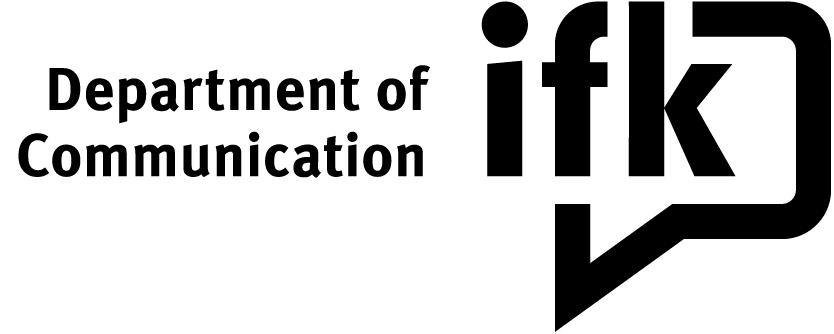

Master Strategic Communication
Overview
- Degree: Master of Arts
- German-language teaching programme
- Workload: 120 ECTS
- Standard period of study: 4 semesters, full-time programme
- Admission only for the winter semester
- 18 students per year
- No tuition fee (only semester fee)
- Application phase from May 2025 (application deadline: 15.07.2025)
Organisations and individuals who want to be heard in today’s society depend on effective strategic communication. That is why experts at the Department of Communication in Münster (IfK) research the goals, processes, and content of communication by, within, between and about organisations. They also examine how communication is perceived and what effects it has. The MA in Strategic Communication at our department provides exactly this knowledge.
The "MA StratKom" specialises in strategic communication in the form of public relations, organisational communication, and advertising. It provides students with the skills to analyse and design strategic communication for various organisations in business, politics, and society in a strategic and goal-oriented manner. Students learn to understand both the perspective of communicators and the viewpoints of target groups and audiences. They also learn to independently and systematically gain and compare this knowledge. Drawing on the findings and methods of uses, and effects research, students learn to analyse, plan and reflect examine strategic communication.
In the seminars, participants also discuss the perception and impact of such communication on stakeholder groups, public, and social developments. version would then be:
In doing so, they engage with a variety of scientific thinking and research logics, including management-oriented, critical, and interpretative approaches. Students benefit from small cohorts (around 18 students per year), close interaction with lecturers, and advanced research opportunities at the department. Students who complete this programme are instantly ready for a practical or academic career.
Frequently asked questions
Who is the MA in Strategic Communication suitable for?
The degree programme is suitable for graduates who, after completing their Bachelor's degree in communication science (or related subject areas), would like to deepen their knowledge and skills in strategic communication Prospective students should not only have a strong interest in Public Relations, corporate communication or organisational communication but also enjoy working with empirical methods. For example, the Master’s programme is also research-oriented and includes a two-semester practical research seminar, combining practical questions with scientific research.
What makes the Master's programme special?
The Master’s degree in Strategic Communication offers a special combination of research areas: public relations and organisational communication on the one hand, and uses and effects research on the other. Its broad thematic approach is unique in German academia.
What will I learn during my studies?
In the MA in Strategic Communication, students explore the foundations, conditions, and impact of strategic communication, as well as social science methods. The programme content is not limited to economic organisations. It also considers the needs and impact of strategic communication in different organisations, such as associations, NGOs, and state institutions across various areas of society.
Is there a special admission procedure?
Yes, there is an admission procedure for the Master’s programme in Strategic Communication. Each winter semester, around 18 students are admitted to the programme. To be considered, applicants need a relevant Bachelor's degree (e.g. in communication science, media studies, or journalism) with a standard study period of at least six semesters, as well as good knowledge of social science methods. As part of the admission process, a committee checks whether the formal admission requirements are met. There are no interviews or additional admission tests. The formal requirements are explained in our admission regulations, available under "Forms and downloads". Further information on admission requirements and procedures can be found on this page.
What career prospects do I have after this degree programme?
The Master's degree in Strategic Communication qualifies students for numerous professional fields that are increasingly interconnected: corporate and organisational communication, PR, internal communication, advertising, and marketing. It also opens up career paths in media, market research, and media planning. With its analytical and methodological orientation, the programme qualifies students for management roles in communication and media industry. A career in academia is also possible. Further information can be found on the page "Life and career".
Is a semester abroad included in the Master's in Strategic Communication?
A semester abroad is not compulsory for MA programmes at the IfK. However, the department has an international profile and maintains 17 Erasmus partnerships. They offer an opportunity to spend a voluntary semester abroad. Students can study abroad during their fourth semester ("Spring Term") in preparation for their Master's thesis and then write their Master's thesis in the following winter semester. Further information on this topic can be found on the page "International".
Do you still have questions? Then take a look at our extensive FAQ about studying at the IfK or contact Dr Stephan Völlmicke (Student Advisory Service, general questions).

